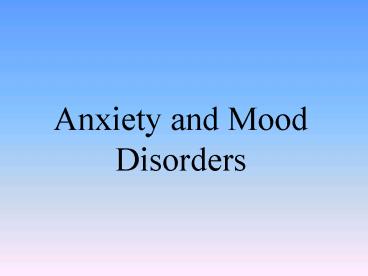Anxiety and Mood Disorders - PowerPoint PPT Presentation
1 / 39
Title:
Anxiety and Mood Disorders
Description:
Anxiety: Vague feeling of apprehension or nervousness ... Formerly called manic-depressive disorder. Many times will follow a cyclical pattern ... – PowerPoint PPT presentation
Number of Views:25
Avg rating:3.0/5.0
Title: Anxiety and Mood Disorders
1
Anxiety and Mood Disorders
2
Anxiety Disorders
3
Anxiety and Anxiety Disorders
- Anxiety Vague feeling of apprehension or
nervousness - Anxiety disorder where anxiety begins to take
control and dominate a persons life
4
Types of Anxiety Disorders
- Anxiety disorders are divided into
- Generalized Anxiety Disorder
- Panic Disorder
- Phobia
- Obsessive-Compulsive Disorder
- Posttraumatic Stress Disorder
5
Anxiety Disorders
6
Anxiety DisordersGeneralized Anxiety Disorder
and Panic Disorder
7
Generalized Anxiety Disorder
- An anxiety disorder characterized by disruptive
levels of persistent, unexplained feelings of
apprehension and tenseness
8
Symptoms of Generalized Anxiety
- Must have at least three of the following
- Restlessness
- Feeling on edge
- Difficulty concentrating/mind going blank
- Irritability
- Muscle Tension
- Sleep Disturbance
9
Panic Disorder
- An anxiety disorder characterized by sudden bouts
of intense, unexplained anxiety - Often associated with physical symptoms like
choking sensations or shortness of breath - Panic attacks may happen several times a day
10
Anxiety DisordersPhobia
11
Phobia
- An anxiety disorder characterized by disruptive,
irrational fears of specific objects or
situations - The fear must be both irrational and disruptive.
12
(No Transcript)
13
Social Phobia
- Phobias which produce fear in social situations
- Fear of speaking in public
14
Agoraphobia
- Fear of situations the person views as difficult
to escape from - Fear of leaving ones home or room in the house
15
Anxiety DisordersObsessive-Compulsive Disorder
16
Obsessive-Compulsive Disorder
- An anxiety disorder characterized by unwanted,
repetitive thoughts and actions - Obsessions repetitive thoughts
- Compulsions repetitive actions
- The obsessions/compulsions begin to take control
of the persons life.
17
(No Transcript)
18
Anxiety DisordersPosttraumatic Stress Disorder
19
Posttraumatic Stress Disorder
- An anxiety disorder characterized by reliving a
severely upsetting event in unwanted recurring
memories (flashbacks) and dreams
20
Anxiety DisordersCauses of Anxiety Disorders
21
Biological Factors
- Hereditary factors may result in a predisposition
for developing anxiety disorders - Brain functions appear to be different in an
anxiety disorder patient - Evolutionary factors may lead to anxiety
disorders.
22
The Brain and OCD
23
Learning Factors
- Through classical conditioning people may
associate fear with an object. - Observational learning--watching another
experiencing fearfulness--may result in
developing fear. - Fear of an object may be reinforced when by
avoiding the feared objects.
24
Mood Disorders
25
Mood Disorders
- Classification of disorders where there is a
disturbance in the persons emotions - Major types of mood disorders include
- Major Depressive Disorder
- Bipolar Disorder
- Dysthymic Disorder
26
Mood Disorders
27
Mania
- Period of abnormally high emotion and activity
28
Depression
- Extended period of feeling sad, listless, and
drained of energy
29
Mood DisordersMajor Depressive Disorder
30
Major Depressive Disorder
- A mood disorder in which a person, for no
apparent reason, experiences at least two weeks
of - depressed moods,
- diminished interest in activities, and
- other symptoms, such as feelings of worthlessness
31
Mood DisordersBipolar Disorder
32
Bipolar Disorder
- A mood disorder in which the person alternates
between the hopelessness of depression and the
overexcited and unreasonably optimistic state of
mania - Formerly called manic-depressive disorder
- Many times will follow a cyclical pattern
33
Mood DisordersCauses of Mood Disorders
34
Biological Factors
- Mood disorders have a hereditary nature to them.
- Depressed individuals tend to have depressed
brains. - PET scans indicate less activity during periods
of depression.
35
Bipolar Disorder PET Scans
36
Social-Cognitive Factors
- Depression may be a variation of learned
helplessness. - Depressed individuals attribute events using the
following characteristics - Stable the bad situation will last for a long
time - Internal they are at fault
- Global all of life is bad
37
Attribution and Depression
38
Determination of Mood
39
The End































